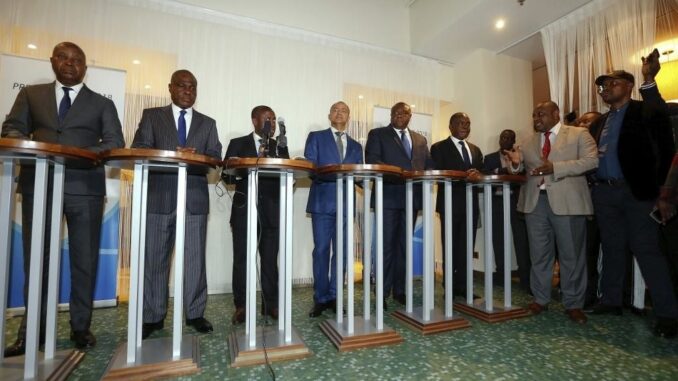
Last elections were a mess within Lamuka, the main opposition platform. Two founding members now claim to be “coordinators.
In coalition with President Félix Tshisekedi since the end of 2020, Moïse Katumbi declared on Saturday 10 April that he was taking over the leadership of Lamuka, a coalition led by Martin Fayulu, who had remained an opponent of Félix Tshisekedi and Joseph Kabila. Kabila installed his ally, former Prime Minister Adolphe Muzito, at the head of the platform for the next three months.
This confusion further weakens the platform, which claimed victory in the last elections, at a time when the country is going through a crucial period in preparation for the 2023 elections.
The two camps have not gotten along since Felix Tshisekedi came to power. The former governor of Katanga, Moïse Katumbi, advocated a republican opposition and participation in the institutions, distancing himself more and more from Martin Fayulu and Adolphe Muzito. For six months, the four founding members of Lamuka had not met formally.
The split was consummated in late 2020, when Moïse Katumbi and former vice-president Jean-Pierre Bemba joined forces with Félix Tshisekedi to oust the pro-Kabila leaders from the institutions, before joining his new coalition, the Sacred Union.
For Martin Fayulu, this is a step too far. Moïse Katumbi and Jean-Pierre Bemba are formally allied with the president and have self-excluded from Lamuka. Their parties should enter the new government, but for Moise Katumbi, it is out of the question to renounce Lamuka.
He announced, in a statement on Saturday, to take “automatically” the head of this coalition in the framework of the rotating coordination at the end of the mandate of Martin Fayulu.
Lamuka now has two coordinators, as former Prime Minister Adolphe Muzito has also taken over the coalition from his ally Martin Fayulu. The two have promised to present a reform of the law on identification and voter registration and are also preparing a draft timetable for elections in 2023.
